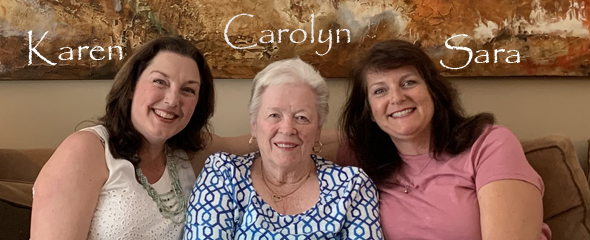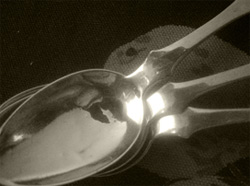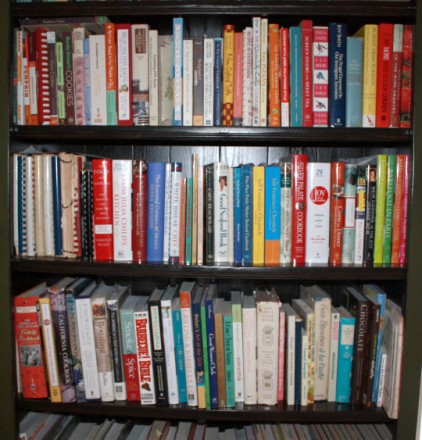I was born with a reading list I
will never finish. – Maud Casey
Sir Francis Bacon wrote: “Some books are to be tasted, others to be swallowed and some few to be chewed and digested; that is, some books are to be read only in parts; others to be read, but not curiously; and some few to be read wholly and with diligence and attention.“
- On my blog sidebar I’ve been writing a list of books I’ve read recently. It’s gotten so long I’ve created a pdf below where you can see the list of books that are older than the last one listed on that sidebar.
Click for PDF here – my list of recent books I’ve read & liked.
Reading is an integral part of my life. Has been since I was very young. Although I do read some non-fiction – biographies, cookbooks (see just 3 of the 6 rows of cookbooks in my kitchen above) – cooking-related tomes or other kinds of memoirs – a few of the “for Dummies” books – and the Holy Bible), mostly I read fiction.
Having been in book clubs since the 1960’s, I’ve read mostly well-written, interesting, thought-provoking, conversation-worthy selections. My AAUW (American Association of University Women – a group comprised of college graduate women) book group chooses a variety of fiction each year, usually including one from the classics. Many of our members are teachers, retired teachers or librarians, and we conform to a school-year calendar). We make a big effort to choose books that will stimulate interesting conversation. We’ve learned that most biographies, all mysteries and pulp fiction just don’t offer enough meaty things to talk about.
A list of my favorite books
These are in no particular order, except the first one, which is probably my all-time favorite book I’ve ever read (I read it in the 1980’s). Some are quite old, and you can likely find multiple copies in your local library. Or, buy used copies. Each book has a link to Amazon.
Pillars of the Earth, by Ken Follett, 1971. Mostly Follett writes espionage and spy novels, but after successes with several books, he felt driven to write Pillars. It’s about the conception and building of a cathedral in England, which spans hundreds of years. That sounds so mundane, but it’s hardly that. Almost like a James Michener style, it’s told in story form. Follett has since written a sequel, World Without End.
The Snow Goose, by Paul Gallico. A beautiful, symbolic love story about snow geese who mate for life.
A Country Year, by Sue Hubbell, 1999. A memoir. After Sue’s divorce and subsequent move to the Ozarks, she learns to beekeep, and asks herself some perennial questions about life, love and the pursuit of happiness. Each chapter is an essay, about the farm, about seasons of the year, or those big questions about life in general. There’s seriousness and humor here.
Forever Amber, by Kathleen Winsor, 1944. Really this is about prostitution in England, oh, way back in history. It is a real tear jerker, and probably more like pulp fiction, but written with some class and not the kind of detail you might read in today’s romance novels.
Gone with the Wind, by Margaret Mitchell. The classic. What can you say about this book, other than it’s an epic novel. I remember reading it (when it first came out) cover to cover at all hours of day and night. I was unbelievably mesmerized by the story.
Andromeda Strain, Michael Crichton, 1969; Crichton’s first novel. I was very taken with Crichton when he came on the writing scene. He was an M.D., but never wanted to practice medicine. So he wrote. And wrote.
My Life in France, (biography of Julia Child), by Julia and her nephew, Alex Prud’Homme. You’ll see all different sides to the woman who was Julia Child. She adored her husband. She was a great adventurer. She was diligent in her efforts to create and perfect recipes. And she and her nephew did a masterful job writing the book.
James Beard’s Delights & Prejudices, by James Beard, 1964. I read this soon after it was published. This is autobiographical, mostly about Beard’s growing-up years in Portland, in the boarding house his mother owned and ran. And you’ll understand perfectly why Beard became a foodie of grand proportions. It’s a memoir, with recipes, and charming stories.
My Antonia, by Willa Cather, 1918. About an immigrant family who move to Nebraska. A little bit of women’s rights, about the hardships of the time, and women’s place in society of that era.
Death Comes for the Archbishop, by Willa Cather, 1927. Purportedly this novel is about the origins of the Catholic faith in the American Southwest, I look at it as more of just a journey in religious faith, period. Although the book spans a couple of centuries, it also dwells on the last few years of the life of one archbishop. It was my first introduction to the kind of mind-think when you’re old and approaching death.
Sacred Hunger, by Barry Unsworth, 1992. An historical novel of the 1780’s, about an English family (mostly about the father and son) who eventually end up on a slave ship (not as slaves) sailing to Africa and on to the New World. Lots of history in between, but ends up as the ship founders off the coast of Florida. Not a particularly happy book, but Unsworth is an excellent writer. Won the Booker Prize.
84, Charing Cross Road, by Helen Hanff, 1970. A novel, but based on a true story. Also made into a movie. It’s a charming, utterly captivating tale, of a correspondence between a learned woman in America, with a antiquarian bookseller’s shop in London. She wants books, they want to sell books, and a over the course of 20 years quite a friendship develops. A very short book. There’s also a sequel to it, The Duchess of Bloomsbury Street.
War & Remembrance, by Herman Wouk, 1978. Part of a trilogy. Takes place during WW II, chronicles the life of a career Navy officer and his family.
A Farewell to France, by Noel Barber, 1983. Out of print now, but maybe you could find it in a used book store. I’ve always had a fascination for France. This is a WW II story about a champagne house in France, the man who owns it, and his romance with a woman. The war intervenes, and it’s quite fascinating reading how they protect the wine. Definitely a pulp fiction book but with interesting historical aspects to it.
Winter Wheat, by Mildred Walker, 1944. Reprinted in 1992 by a collective wanting to renew interest in some obscure but noteworthy books. One of my book club members is from Montana, and recommended this book. I ended up doing the review, and was quite taken with it. It’s historical fiction, about a young woman in the 1940’s, her relationship with her father and mother (who is a Russian immigrant) and her eventual job as a teacher in a extremely remote Montana town where she lives in a small room attached to the schoolhouse. No power. No phone. Amazing story of hardship and resilience.
The Piano Tuner, by David Mason, 2002. Fascinating glimpse into the history of Burma under British rule. About a rather aesthetic man, a piano tuner by trade, who is hired by the British government to go to Burma (not an easy feat in that time) to tune a piano in a very remote semi-military outpost, ravaged by war. Made me want to see that part of the world, though I doubt I ever will do so.
Chesapeake, by James Michener, 1978. I’ve read nearly all of Michener’s works, but I believe this one was my favorite. About the American founders of the Chesapeake Bay. Like all of Michener’s books that chronicle several centuries, this one spans about 400 years, from about 1583 to 1978.
David Copperfield, by Charles Dickens, 1850. I’ve read most of Dicken’s novels, but this one was my favorite. I really was taken with the character, the hardships he endured, and his insatiable desire to better himself. It’s about the innumerable people he encounters in his life and how he learns from every experience. And matures. Supposedly the book is somewhat autobiographic of Dickens’ life.
Five Smooth Stones, by Ann Fairbairn, 1966. About an interracial relationship. Very heartbreaking and heartwarming, about love and challenges. I haven’t read it since the 1960’s – don’t even own the book. But I’ve never, ever, forgotten it. It’s out of print now, but perhaps available at a library. A few used copies are available through Amazon.
Atlas Shrugged, by Ayn Rand, 1957. I so often read books at face value, and don’t dwell on the inner meaning. It was only years later that I read a review and learned about Rand’s purpose. According to Wikipedia: “Atlas Shrugged portrays fascism, socialism and communism – any form of state intervention in society – as systemically and fatally flawed. However, Rand claimed that it is not a fundamentally political book, but that the politics portrayed in the novel are a result of her attempt to display her image of the ideal person and the individual mind’s position and value in society.” Whatever the true meaning, I was quite taken with the characters and enjoyed reading about the remote town in Colorado (purportedly based on the town of Ouray, one of my favorite small towns of America) where John Galt goes – to live, to escape. I should re-read it now. There are even books written about Atlas Shrugged.





